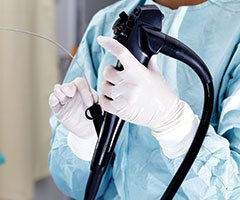Colon (Colorectal) Cancer
What is colorectal cancer?
Colorectal cancer is a type of cancer that originates in the colon (the large intestine) or rectum, which is the end of the large intestine that connects to the anus. Most colorectal cancers develop from precancerous growths called polyps, which can eventually turn into cancer if not removed.
Regular screenings, such as colonoscopies, are essential for early detection and the prevention of colorectal cancer. Detecting and removing polyps during these screenings can significantly reduce the risk of cancer development.
Who does this cancer affect?
A family history of colon or rectal cancer, diet, alcohol consumption, smoking, and inflammatory bowel disease are some of the risk factors for colorectal cancer. There are about 50,000 people who die from colorectal cancer each year in the U.S. and colon cancer has the second-highest death rate of all cancers.
What are the symptoms of colon cancer?
Understanding the risk factors and symptoms for colorectal cancer is crucial for individuals and healthcare professionals in managing this disease.
Don’t ignore the symptoms of colon cancer:
- Bloody stools
- Rectal bleeding
- Unexplained weight loss or fatigue
- Cramping in the lower stomach
- Change in bowel habits
These things are not normal, so talk to your doctor immediately. Patients have a variety of treatment options based on the severity of the disease. In its earliest stage, colon cancer is highly treatable.
-
-
Richard M. Schulze Family Foundation Cancer Clinic - Bonita Health Center
3501 Health Center Blvd Estero, FL 34135
Colorectal Disease Diagnosis and Screening
Lee Health gastroenterologists use a variety of tests and procedures to screen for and diagnose colorectal disease, including one or more of the following:
- Colonoscopy: An exam that allows doctors to see inside the colon and rectum using a camera attached to a thin, flexible tube (called a colonoscope). Colonoscopy allows doctors to examine the entire colon.
- Sigmoidoscopy: Also known as flexible sigmoidoscopy, this test is similar to a colonoscopy — both are used to screen for or diagnose various types of colorectal disease, using a camera attached to a colonoscopy. Sigmoidoscopy only looks at the last portion of the colon closest to the rectum, called the sigmoid colon. Learn more about the differences between colonoscopy and sigmoidoscopy.
- Endoscopic Ultrasound: EUS is a procedure that combines endoscopy and ultrasound to capture high-quality images of the digestive tract. It’s often used to help diagnose colon cancer.
- Capsule Endoscopy: this is a procedure that uses a tiny camera, which is placed inside a pill-sized capsule and swallowed, to take pictures of the gastrointestinal tract. The images are recorded on a device worn around the waist.
- Anal Manometry: this is a test used to evaluate how well the muscles in the anus and rectum are working. It’s frequently used to diagnose fecal incontinence or chronic constipation.
Colorectal Cancer Care Support Services
When facing a cancer diagnosis, it's crucial to have access to cancer support services. We are committed to being your trusted partner throughout your cancer journey, offering a wide range of services tailored to meet your unique needs.
-
Cancer Nutrition Counseling
Our expert oncology dietitians offer personalized guidance to help you maintain optimal health and manage side effects during your cancer treatment. Learn how proper nutrition can positively impact your journey to recovery! Explore cancer nutrition counseling services at Lee Health.
-
Cancer Support Groups
Cancer support groups are gatherings that provide a secure environment for those impacted by the disease to talk about their feelings and experiences with other cancer patients.
-
Nurse Navigation
Lee Health Cancer Institute nurse navigators are here to help the patient and family through their cancer journey. From the moment of diagnosis to the treatment plan, our nurse navigators are here for you.
Lee Health Cancer Institute
Colon cancer has the second-highest death rate of all cancers. Here you’ll find educational, medical, and awareness resources for people diagnosed with colorectal cancer in our community.
-
Cancer Institute
Start your cancer care journey here. An umbrella for all of Lee Health's state-of-the-art cancer care options.
Click 'show more' to view all physicians

















